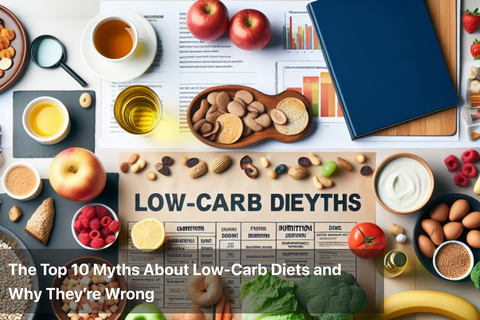
How a Low-Carb Diet Affects Your Body and Health
The food we eat has a profound impact on how we feel, function, and heal. A low-carb diet, which reduces the intake of carbohydrates in favor of protein, healthy fats, and fiber-rich vegetables, creates significant changes in the body. From energy metabolism to hormonal balance, nearly every system responds when carbs are reduced. These changes can be beneficial, especially when the diet is approached mindfully with a focus on whole, nutrient-dense foods.

The Shift in Energy Metabolism
Carbohydrates are the body’s primary energy source. When consumed, carbs break down into glucose, which fuels cells. In a low-carb diet, glucose availability is limited. As a result, the body shifts to burning fat for energy—a process known as fat adaptation.
In very low-carb conditions, the liver begins to produce ketones, an alternative fuel source derived from fat. This metabolic state, called ketosis, can enhance fat-burning efficiency and improve mental clarity for some individuals.
This switch in energy systems:
-
Reduces reliance on quick-burning sugar
-
Promotes steady energy levels throughout the day
-
Increases the body’s ability to access stored fat for fuel
Blood Sugar and Insulin Regulation
Reducing carbohydrates naturally leads to lower blood sugar levels. This has a direct impact on insulin, the hormone responsible for transporting glucose into cells. A high-carb diet causes frequent spikes in blood sugar and insulin, which can lead to insulin resistance over time.
On a low-carb diet:
-
Blood sugar levels become more stable
-
Insulin secretion decreases
-
Insulin sensitivity improves, particularly in people with prediabetes or type 2 diabetes
Lower insulin levels also help the body stop storing fat and begin burning it instead. This shift supports long-term fat loss and reduces the risk of metabolic syndrome.
Weight Loss and Fat Burning
Low-carb diets are well known for promoting weight loss, especially in the early stages. Several mechanisms contribute to this:
-
Decreased insulin levels allow for more effective fat burning
-
Reduced appetite due to higher satiety from fats and proteins
-
Loss of water weight as glycogen stores are depleted
-
Lower calorie intake without the need for tracking or restriction
Unlike low-fat diets that often leave people hungry, a low-carb approach tends to naturally reduce calorie consumption by increasing fullness.
Hormonal Balance
Hormones play a crucial role in metabolism, mood, and reproductive health. A low-carb diet influences several important hormones:
-
Ghrelin, the hunger hormone, often decreases, reducing the urge to overeat
-
Leptin, the satiety hormone, becomes more balanced, supporting better appetite control
-
Cortisol, the stress hormone, may initially rise during carb withdrawal but typically stabilizes
-
Testosterone and estrogen levels may improve in cases of insulin resistance or PCOS
For individuals with polycystic ovary syndrome (PCOS), a low-carb diet can regulate menstrual cycles, reduce acne, and improve fertility by lowering insulin and androgen levels.
Digestive Health and Gut Function
A diet high in refined carbs can disrupt gut health, contributing to bloating, irregularity, and imbalanced gut flora. Shifting to a low-carb diet that emphasizes fiber-rich vegetables and whole foods supports digestion in several ways:
-
Reduces fermentation of sugars in the gut, decreasing gas and bloating
-
Encourages growth of beneficial gut bacteria
-
Supports regular bowel movements when fiber intake is adequate
Digestive improvement is often one of the first positive changes people notice after reducing processed carbs and sugars.
Mental Clarity and Brain Function
Frequent blood sugar spikes and crashes can contribute to mood swings, brain fog, and low concentration. As the body adapts to using fat and ketones for energy, many people report:
-
More consistent energy levels throughout the day
-
Sharper focus and improved concentration
-
Better mood regulation due to stabilized blood sugar
-
Reduced dependence on caffeine or sugar for mental alertness
The brain functions efficiently on ketones, which may explain the cognitive boost that accompanies low-carb eating.
Cardiovascular Health
A common concern with low-carb diets is fat intake, especially saturated fat. However, when the diet is based on healthy fats and unprocessed foods, it can support heart health in several ways:
-
Increases HDL (good cholesterol)
-
Lowers triglycerides
-
Improves LDL particle size, reducing cardiovascular risk
-
Reduces blood pressure in overweight or insulin-resistant individuals
By eliminating refined carbs and sugar, the diet lowers systemic inflammation and supports vascular health.
Potential Side Effects and Adaptation Phase
The body often undergoes an adjustment period when transitioning to a low-carb diet, sometimes referred to as the “low-carb flu.” Temporary symptoms may include:
-
Headache
-
Fatigue
-
Muscle cramps
-
Brain fog
-
Irritability
These effects usually last a few days and can be minimized by:
-
Staying hydrated
-
Increasing salt and electrolytes
-
Easing into the diet gradually
-
Getting adequate sleep and rest
Once adapted, most people report feeling more energetic and mentally alert.

Who Should Use Caution
While a low-carb diet is safe for most people, it may not be suitable for everyone. Individuals who should consult a healthcare provider before starting include:
-
People with kidney disorders
-
Those with type 1 diabetes
-
Pregnant or breastfeeding women
-
Individuals on blood sugar or blood pressure medications
-
Anyone with a history of eating disorders or chronic illness
Summary
A low-carb diet has a wide-reaching impact on the body and health. From fat-burning metabolism to hormonal balance, blood sugar control, and reduced inflammation, the benefits go far beyond weight loss. The body becomes more efficient at using fat for energy, while mental clarity, digestive health, and cardiovascular function improve. By focusing on whole, nutrient-rich foods and reducing sugar and refined carbs, individuals can experience a renewed sense of vitality and well-being.
This Blog post is an initiative by Lo! Foods, to provide accurate and Nutritionist / Doctor approved information related to Health. Lo! Foods is India's leading brand for Everyday Functional Foods. Foods designed for specific Health conditions or Needs. Lo! Foods also runs India's largest range of Low Carb Healthy Cloud Kitchens, under the brand names of Lo!, ProteinChef, ATH (All Things Healthy) and DiabeSmart.













Leave a comment
Your email address will not be published.